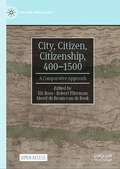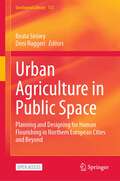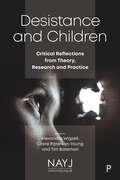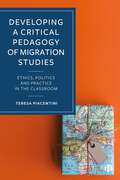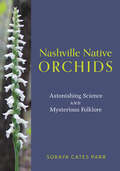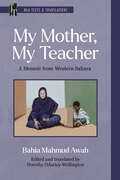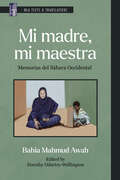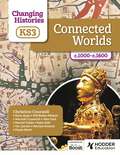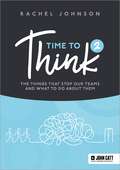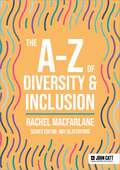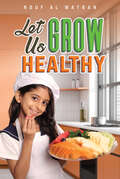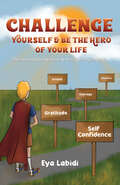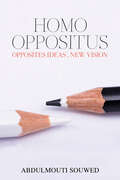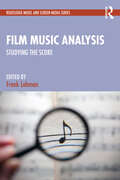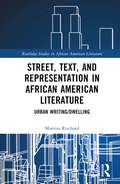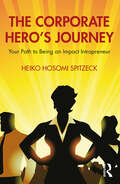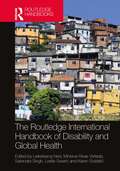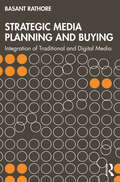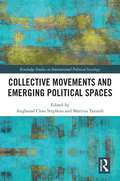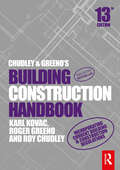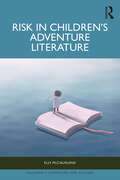- Table View
- List View
City, Citizen, Citizenship, 400–1500: A Comparative Approach (The New Middle Ages)
by Robert Flierman Els Rose Merel de Bruin-van de BeekThis open access book explores how medieval societies conversed about the city and citizen in texts, visual imagery and material culture. It adopts a long-term, interdisciplinary, and cross-cultural perspective, bringing together contributions on the early, high, and later Middle Ages, covering both the medieval East and West, and representing a wide variety of disciplinary angles and sources. The volume is first and foremost about medieval perceptions and their articulation in text, image and material form. The principal focus is not on cities or citizenship per se, but on those who used such concepts, wrote about them, and visualized and depicted them. At the same time, the book seeks to address why the city remained such a salient concept also in non-urban contexts – the periphery, the desert, the monastery – and how medieval thinking on the ideal city and civic community could involve denunciation of the earthly city and its institutional trappings. It thus pushes scholarly boundaries, but also seeks to escape deeply entrenched notions of citizenship as either a form of political participation or legal status.
Urban Agriculture in Public Space: Planning and Designing for Human Flourishing in Northern European Cities and Beyond (GeoJournal Library #132)
by Deni Ruggeri Beata SirowyThis open access book discusses urban agriculture initiatives integrated in public space of dense inner-city neighbourhoods, thereby ensuring its accessibility for large and diverse segments of urban populations. It specifically focuses on the potential impacts of urban agriculture on human well-being (both on individual and community levels), and how planning, design, policy and management practices can maximize these impacts. The book addresses urban agriculture on both a micro and macro scale to facilitate a transition to more sustainable lifestyles and enhance the quality of urban life. It also discusses ways to permanently integrate urban agriculture in existing and planned public spaces in a visually attractive, socially inclusive, and democratic manner to claim and reclaim the right to the city. Based on the research outcomes of the project “Cultivating Public Space: urban agriculture as a basis for human flourishing and sustainability transition in Norwegian cities” funded by the Research Council of Norway, the book emerges from a Norwegian context, but extends to include international urban agriculture cases from the Netherlands, Denmark, the UK and more. By including a diversity of voices and cultural perspectives, the editors aimed to make this book engaging and relevant to an international audience of researchers, policy makers, urban designers, planners, educators, community activists, residents, and public space users of the sustainable, compact city of today and the future.
Desistance and Children: Critical Reflections from Theory, Research and Practice
by Colin Falconer John Wainwright Julie Shaw Martin Stephenson Claire Fitzpatrick Neal Hazel Stephen Case Samantha Burns Jo Staines Kathy Hampson Gilly Sharpe Steve Carr Kirstine Szifris Diana Johns Kevin R Haines Ross Little Katie Hunter Tim Rosier Sean Creaney Andrew Brierley Anne-Marie Douglas Roberta Evans Neema Trivedi-BatemanAvailable open access digitally under CC BY-NC-ND licence. ‘Desistance’ - understanding how people move away from offending – has become a significant policy focus in recent years, with desistance thinking transplanted from the adult to the youth justice system in England and Wales. This book is the first to critique this approach to justice-involved children, many of whom are yet to fully develop an identity (criminal or otherwise) from which to ‘desist’. Featuring voices from academia, policy and practice, this book explores practical approaches to desistance with children in the ‘Child First’ context. It gives new insights into how children can be supported to move away from offending and proposes reforms to make a meaningful difference to children’s lives.
Developing a Critical Pedagogy of Migration Studies: Ethics, Politics and Practice in the Classroom
by Teresa PiacentiniMigration as a taught subject is entrenched in social and political debates, with the classroom firmly framed as a site of committed social and political encounter. That means teaching migration through the prism of critical pedagogy is a political and ethical necessity. This book invites readers to examine their own relationships with migration, ethics, politics and power. It encourages teachers, students and practitioners to think critically about their position in relation to the knowledge they both bring and gain. With pedagogical features that provide space for reflection and discussion, this is a transformative resource in reshaping how we teach and learn about migration.
Nashville Native Orchids: Astonishing Science and Mysterious Folklore
by Soraya Cates ParrHidden in the greenways, parks, and backyards of Nashville are several varieties of stunning native orchids. The vibrant, three-petaled flower has been revered for centuries for its exoticism and inspirational qualities. But these natural treasures, long part of a rich folk tradition, have been largely forgotten by many Nashvillians. This useful guidebook offers a comprehensive look into the secret lives of Davidson County&’s six native orchid species. Alongside vibrant, eye-catching photographs of plant life cycles that provide a straightforward way for readers to quickly identify these varieties, the book offers the fascinating history of these wild wonders as told by author Soraya Cates Parr, a passionate horticulturalist with a knack for explaining the natural world in an accessible way. More than just a useful guide to Nashville&’s flora, Nashville Native Orchids is a reminder of the risk that unbridled urban development can pose to the delicate natural ecosystem. Throughout the book, Parr shows the local effects of climate change on Nashville&’s native orchid population and advocates for a more sustainable approach to development. Beyond the environmental dimensions, this book presents an illuminating discussion of the historical significance of orchids and their central role in folkloric traditions.
My Mother, My Teacher: A Memoir from Western Sahara (MLA Texts and Translations)
by null Bahia Mahmud AwahSeparated from his family in the aftermath of the failed decolonization process in Western Sahara, Bahia Mahmud Awah was sustained by recollections of his mother. In this memoir, he describes her sacrifices, her optimism, and her deep love. His family's experiences exemplify the larger story of loss and displacement in the region even as his story shows how shared memories can nourish community and culture across generations, even in exile. Incorporating poetry in Hassaniya, the traditional Saharawi language, the work highlights the role of language in shaping identity and resisting colonialism.First published in 2011 as La maestra que me enseñó en una tabla de madera (The Woman Who Taught Me on a Wooden Slate), this edition includes the first complete English translation and a new epilogue by the author featuring further remembrances of his mother and examples of her poetry.
Mi madre, mi maestra: Memorias del Sáhara Occidental (MLA Texts and Translations #43)
by null Bahia Mahmud AwahSeparated from his family in the aftermath of the failed decolonization process in Western Sahara, Bahia Mahmud Awah was sustained by recollections of his mother. In this memoir, he describes her sacrifices, her optimism, and her deep love. His family's experiences exemplify the larger story of loss and displacement in the region even as his story shows how shared memories can nourish community and culture across generations, even in exile. Incorporating poetry in Hassaniya, the traditional Saharawi language, the work highlights the role of language in shaping identity and resisting colonialism.First published in 2011 as La maestra que me enseñó en una tabla de madera (The Woman Who Taught Me on a Wooden Slate), this edition includes a new epilogue by the author featuring further remembrances of his mother and examples of her poetry.
Changing Histories for KS3: C.1000c.1600
by Christine Counsell Katie Hall Alex Ford Rachel Foster Tim Jenner Kerry Apps Will Bailey-Watson Hannah Cusworth Nicolas Kinloch Paula WorthChange the history that pupils learn at Key Stage 3. Reframe familiar topics, discover forgotten stories and amplify unheard voices.Through an evocative, story-based approach, this ground-breaking course brings together historical scholarship and enquiry, presenting a truly diverse, inclusive and ambitious history curriculum.This is the history we owe to our pupils. This is the past for today and tomorrow.> Establish a strong foundation of British history. A clear, chronological spine underpins each book, empowering pupils with the knowledge they need to understand, question or disrupt national narratives.> Journey far beyond Britain. Move between local and global, between small details and wider developments, as the books blend depth and overview, expanding pupils' knowledge of people, places and events around the world and the links between them.> Use the power of story to transform your teaching. Captivated by vivid, intriguing narratives, pupils will remember more than they ever have before. See their literacy improve as they encounter a wide vocabulary in context, become immersed in rich, quality texts, and enjoy hearing the book read aloud or reading it themselves.> Teach a diverse curriculum with confidence. Gender, class, race and religion are treated with sensitivity and sophistication, intrinsically woven into the content to create perspective on social, economic, religious and political history.> Stay up to date with historical scholarship. The authors have undertaken extensive reading, so every chapter is informed by current research from historians such as Helen Castor, Ruby Lal and Toby Green.> Deliver the aspirational curriculum that Ofsted expects. The course embodies the requirements for scope, coherence, rigour and sequencing. The Changing Histories curriculum is a progression model. Skills and knowledge are built systematically across each lesson sequence and new material makes sense to pupils because of the content covered earlier.> Trust a meticulously planned approach. Each 'enquiry' chapter helps pupils to shape an extended answer to the overarching question, with carefully paced 'steps' that support pupils in processing substantive knowledge. Shorter 'story summary' chapters keep narratives moving in between the enquiries.> Benefit from some of the best minds in history education. Leaders in history curriculum, practice, research and debate, the authors have poured their expertise into every page, making quality history accessible to all.
Time to Think 2: The things that stop our teams and what to do about them
by Rachel JohnsonBeing a leader involves having followers and working as a team. Sometimes our teams get stuck and issues emerge that we don't always feel equipped to deal with. How do we get buy in, keep momentum, recognise and overcome dysfunction, and get the best out of introverts and extroverts so that everyone feels safe and brave? This book is for people who want to be daring and responsible in their leadership, who want to embrace paradoxes, and understand how to create and maintain thriving teams. Use this book to help you work through the issues that are most relevant to you and your teams so that you, and they, can thrive.
The A-Z of Diversity & Inclusion (John Catt A-Z series)
by Rachel MacfarlaneThe A-Z of Diversity and Inclusion is a powerful blend of advice, reflection and provocation on these vital topics, organised around the 26 letters of the English alphabet.Great educators recognise how diversity enriches their organisation. They have an ambition for every learner (adult and child) to be seen, represented and included, for their needs to be met and any barriers they are experiencing to be understood, tackled and overcome. To achieve this requires dogged determination, relentless and forensic focus and unwavering optimism and energy.Inclusive educators quite literally change lives.
Changing Histories for KS3: C.1000c.1600
by Christine Counsell Katie Hall Alex Ford Rachel Foster Tim Jenner Kerry Apps Will Bailey-Watson Hannah Cusworth Nicolas Kinloch Paula WorthChange the history that pupils learn at Key Stage 3. Reframe familiar topics, discover forgotten stories and amplify unheard voices.Through an evocative, story-based approach, this ground-breaking course brings together historical scholarship and enquiry, presenting a truly diverse, inclusive and ambitious history curriculum.This is the history we owe to our pupils. This is the past for today and tomorrow.> Establish a strong foundation of British history. A clear, chronological spine underpins each book, empowering pupils with the knowledge they need to understand, question or disrupt national narratives.> Journey far beyond Britain. Move between local and global, between small details and wider developments, as the books blend depth and overview, expanding pupils' knowledge of people, places and events around the world and the links between them.> Use the power of story to transform your teaching. Captivated by vivid, intriguing narratives, pupils will remember more than they ever have before. See their literacy improve as they encounter a wide vocabulary in context, become immersed in rich, quality texts, and enjoy hearing the book read aloud or reading it themselves.> Teach a diverse curriculum with confidence. Gender, class, race and religion are treated with sensitivity and sophistication, intrinsically woven into the content to create perspective on social, economic, religious and political history.> Stay up to date with historical scholarship. The authors have undertaken extensive reading, so every chapter is informed by current research from historians such as Helen Castor, Ruby Lal and Toby Green.> Deliver the aspirational curriculum that Ofsted expects. The course embodies the requirements for scope, coherence, rigour and sequencing. The Changing Histories curriculum is a progression model. Skills and knowledge are built systematically across each lesson sequence and new material makes sense to pupils because of the content covered earlier.> Trust a meticulously planned approach. Each 'enquiry' chapter helps pupils to shape an extended answer to the overarching question, with carefully paced 'steps' that support pupils in processing substantive knowledge. Shorter 'story summary' chapters keep narratives moving in between the enquiries.> Benefit from some of the best minds in history education. Leaders in history curriculum, practice, research and debate, the authors have poured their expertise into every page, making quality history accessible to all.
Time to Think 2: The things that stop our teams and what to do about them
by Rachel JohnsonBeing a leader involves having followers and working as a team. Sometimes our teams get stuck and issues emerge that we don't always feel equipped to deal with. How do we get buy in, keep momentum, recognise and overcome dysfunction, and get the best out of introverts and extroverts so that everyone feels safe and brave? This book is for people who want to be daring and responsible in their leadership, who want to embrace paradoxes, and understand how to create and maintain thriving teams. Use this book to help you work through the issues that are most relevant to you and your teams so that you, and they, can thrive.
The A-Z of Diversity & Inclusion (John Catt A-Z series)
by Rachel MacfarlaneThe A-Z of Diversity and Inclusion is a powerful blend of advice, reflection and provocation on these vital topics, organised around the 26 letters of the English alphabet.Great educators recognise how diversity enriches their organisation. They have an ambition for every learner (adult and child) to be seen, represented and included, for their needs to be met and any barriers they are experiencing to be understood, tackled and overcome. To achieve this requires dogged determination, relentless and forensic focus and unwavering optimism and energy.Inclusive educators quite literally change lives.
Death Penalty in Decline?: The Fight against Capital Punishment in the Decades since Furman v. Georgia
by Austin SaratHow have prospects for abolishing the death penalty changed since the 1972 Supreme Court decision, Furman v Georgia? The editor and contributors to Death Penalty in Decline? assess the contemporary death penalty landscape and look at the trends in and attitudes toward capital punishment and its abolition. They highlight factors that are propelling alternatives to the death penalty as well as the obstacles to ending it. At a time when the United States is undertaking an unprecedented national reconsideration of the death penalty, Death Penalty in Decline? seeks to evaluate how abolitionists might succeed today. Contributors: John Bessler, Corinna Barrett Lain, James R. Martel, Linda Ross Meyer, Carol S. Steiker, Jordan M. Steiker, and the editor
Let Us Grow Healthy
by Nouf Al WatbanAre you expecting a baby or want your children to develop healthy eating habits but don’t know where to start? Let Us Grow Healthy is your guide to making better food choices for your family by focusing on wholesome, nutrient-dense foods while limiting unnecessary junk. This book will teach you: · The importance of proper nutrition during pregnancy. · What it means to choose fresh, whole, clean foods. · How to strengthen your child’s immune system through diet. · How to manage food allergies. · The meaning of GMOs and how to avoid them. · The essential vitamins and minerals kids need to thrive. · Why leafy greens and herbs/spices should be diet staples. · Tips for reducing salt and sugar intake. · Ways food can improve brain development and heart health. Let Us Grow Healthy aims to increase your nutrition knowledge with interesting tips and recommendations so you feel empowered to make the best dietary choices for your child’s optimal growth and long-term health. It’s never too early or too late to establish healthy eating habits!
Challenge Yourself & Be the Hero of your Life: Personal Development & Positive Psychology
by Eya LabidiThis book is designed to lay the foundation for a solid and positive upbringing, starting from a child’s first readings and continuing through their teenage years and into adulthood. Written in accessible language, this book engages young readers and captures their attention through independent chapters, each focusing on a specific and fundamental concept. Every section concludes with dynamic, practical exercises related to the notion studied, providing children with valuable advice that is both motivating and challenging enough to help them develop new skills. Among the many treasures within these pages, children will find tools to promote self-expression, personal development, and self-confidence. They will learn how to overcome fears, believe in themselves, unravel emotional blockages, and nurture their natural curiosity. In essence, this book is an exciting adventure where the beloved reader is both the superhero and the heart of its content. By embarking on this journey, children will be well-prepared to face the challenges of growing up, armed with the knowledge and skills necessary to lead fulfilling and successful lives. This book is an invaluable resource for parents and educators who wish to support the positive development of the children in their care.
Homo Oppositus: Opposites Ideas , New Vision
by Abdulmouti SouwedThe core concept of this book is one that resonates with everyone, yet it is explored and presented in a fresh and unique perspective as envisioned by the author. After delving into and discussing this familiar idea, the author arrives at a profound conclusion: that humans embody contradictions within themselves. This introspection leads back to the timeless question: what truly defines a human? In this insightful exploration, the author proposes that humanity is inherently chaotic and self-contradictory. This raises a compelling question in our current era of digital advancement and artificial intelligence: Are we, as a species, still influenced by an ‘archaic mindset’ in this modern age? This book challenges readers to reconsider their understanding of human nature in the context of rapidly evolving technology.
Film Music Analysis: Studying the Score (Routledge Music and Screen Media Series)
by Frank LehmanSince the establishment of film music studies, there has been a steady growth of serious analytical work on the film music repertoire. Film Music Analysis: Studying the Score offers the first collection of essays dedicated to the close investigation of musical structure and meaning in film music. Showcasing scholarship from a diverse and distinguished group of music theorists and musicologists, this book presents the many ways to inspect the inner workings of film music in a manner that is exciting and accessible to anyone curious about this music, regardless of their background in film or music theory.Each chapter takes as its focus one music-theoretical parameter and explores how that concept can be used to analyze and interpret film music. Covering theoretical concepts that range from familiar categories such as leitmotif and pitch structure to more cutting-edge ideas such as timbral associativity, topic theory, and metrical states, the book provides a toolkit with which to explore this captivatingly varied repertoire. With example analyses drawn from classic and contemporary films, Film Music Analysis: Studying the Score is a valuable teaching tool and an indispensable addition to the library of any lover of film and music.
Street, Text, and Representation in African American Literature: Urban Writing/Dwelling (Routledge Studies in African American Literature)
by Mattius RischardComprehensive and comparative, this volume investigates African American street novelists since the Chicago Black Renaissance and the semiotic strategies they employ in publication, consumption, and depiction of street life. Divided into three chapters, this text analyzes the content, style, and ethics of “street” narrative through a discursive/rhetorical lens, exploring the development of street literature’s formal and contextual concerns to resolve the sociocultural and political questions surrounding cultural work. The book also gives emphasis to “text” or (post)structural literary analysis by answering questions about the genre’s aesthetic and linguistic techniques that respond to the injustices of urban planning. The last chapter, “Representation,” investigates the phenomenological hermeneutics of more recent street literature and its satire, highlighting the political stakes for authorship, credibility, and subjectivity. Through historical and contemporary studies of urban space, Blackness, and adaptations of street literature, this work attempts to network activists, artists, and scholars with the greater reading public by providing a functional ontology of reading the inner city.
The Corporate Hero's Journey: Your Path to Being an Impact Intrapreneur
by Heiko Hosomi SpitzeckImpact intrapreneurs at some of the most powerful organizations in the world are designing new, more sustainable businesses from within. They put their values to work and transform their corporations into a force for good. In a corporate world that still largely prioritizes profit above all else, these people shine a light on how to balance profit with impact, and the inspirational stories captured in this book guide leaders and managers to do the same.The lack of purpose beyond profit is causing millions of people to question their work and even to leave the corporate world altogether. Companies are struggling with recruitment and retention, as people seek a greater sense of purpose. For many, this would mean finding a way to use their work as a platform for positive social and environmental impact. This book will inspire this change for leaders seeking a different and better way forward. Structured around the stages of Joseph Campbell’s hero’s journey – upon which Star Wars was based – this book combines the philosophy of Star Wars with inspiring stories of impact intrapreneurs. You’ll get to know Corporate Jedi such as Susie Lonie and Nick Hughes, who, while working for Vodafone in Kenya introduced a mobile payment method which brought financial inclusion to millions; Myriam Sidibé at Unilever, who turns making soap into saving lives; and Gib Bulloch, founder of Accenture Development Partnerships, which provides first-class consulting services to NGOs leveraging their impact. With actionable advice, such as how to create a business case, how to measure social impact, and more, the book is not only an entertaining read, but also helps executives apply insights to their own daily work.Written for leaders, managers, and all professionals looking to create positive impact through their work, this book will give future Corporate Jedi the courage and tools to use the force of business for good.
The Routledge International Handbook of Disability and Global Health (Routledge International Handbooks)
by Leslie Swartz Karen Soldatić Lieketseng Ned Minerva Rivas Velarde Satendra SinghThis handbook will raise awareness about the importance of health and well-being of people with disabilities in the context of the global development agenda: Leaving No-one Behind.There has been a growing discussion on how people with disabilities should be included in the global health landscape. An estimated one billion people have some form of disability, 80% of whom live in low- and middle-income settings. People with disabilities are more likely to be poor, with restricted access to health and social services, education, rehabilitation and employment. Despite this, people with disabilities are often overlooked in global health and development efforts. Furthermore, the COVID-19 pandemic has shown that unless systematically planned for and included in policies and programmes, people with disabilities remain at an increased risk of being adversely affected in times of humanitarian crisis and emergency disasters.Divided into eight sections: Disability and Health Frameworks Health Justice, Rights and Bioethics Gendering Disability Health Disability and Global Mental Health Disability and Access to Healthcare, Including Workforce Development Crises and Health Technology and Digital Health Disability, Ageing and Dementia Care This handbook covers the full range of topics pertaining to disability and global health including inclusive health; access to rehabilitation; global mental health and disability; medical training and disability; community based inclusive development for improving health and rehabilitation; maternal health and sexual reproduction; preventive care and health promotion for people with disabilities; health, disability and indigenous knowledges; bioethics and human rights; data protection; and health in the global south.It will be of interest to all scholars, students and professionals working in the fields of disability studies, health studies, nursing, medicine, allied health, development studies and sociology.
Strategic Media Planning and Buying: Integration of Traditional and Digital Media
by Basant RathoreThis book explores media planning, media buying and the advertising landscape in India. It provides a comprehensive look into the essential aspects of media strategies for brands and businesses to effectively reach their intended audiences and consumers.The book cuts through and demystifies complex media jargon and theories to provide an understanding of the key concepts for developing a media mix that will yield results for businesses. It discusses media research and theories and offers marketers suggestions on how to use both traditional and digital media effectively to build brands. The first section of the book introduces the basics of media theory, including data collection methodologies and their application. The second section covers the fundamentals of planning a media strategy and advertising plans and campaigns based on the goals of the company or brand. The third section discusses the practical nuances of planning – like media mix selections, media vehicle selections and media buying across all types of media.This book will be of interest to students and researchers of business and management studies, media and communication studies as well as to marketing and media professionals working in different sectors of business.
Collective Movements and Emerging Political Spaces (Routledge Studies in International Political Sociology)
by Angharad Closs StephensCollective Movements and Emerging Political Spaces addresses the politics of new forms of collective movements, ranging from anti‑austerity protests to migrant struggles and anticolonial demonstrations.Drawing on examples from various countries, as well as struggles taking place across borders, this book traces the emergence of new practices of being political, described as ‘collective movements’. These represent something looser than a common identity – long held as necessary for a political struggle to cohere. They also suggest a different understanding of emancipation to the promise of transformation in time. By addressing various examples of ‘collective movements’, the chapters in this book examine other ways of being political together, formed through relations carved in cramped spaces or small movements that rearrange our ideas about what is possible. Drawing on the temporary and fleeting nature of many migrants’ struggles, the chapters develop concepts and approaches that acknowledge how such mobilisations trouble many standard political sociological categories – including nation, identity and citizenship. In combining an attentiveness to theories of affect, emotion and atmosphere, they also go beyond a focus on either individuals or collectives, to address the ways bodies are moved by the world and by others. Overall, the chapters propose new questions, methods and starting points for addressing collective movements in emerging political spaces, and for understanding how what counts as politics is being redrawn on the ground.This book will interest students, researchers and scholars of international political sociology, human geography, international relations, critical security studies and migration studies.
Chudley and Greeno's Building Construction Handbook
by Roy Chudley Roger Greeno Karl KovacThe 13th edition of Chudley and Greeno’s Building Construction Handbook remains THE authoritative reference for all construction students and professionals. The principles and processes of construction are explained with the concepts of design included where appropriate. Extensive coverage of building construction practice, techniques and regulations representing both traditional procedures and modern developments are included to provide the most comprehensive and easy-to-understand guide to building construction.This new edition has been updated to reflect recent changes to the Building Regulations, as well as including new material on modern methods of construction, greater emphasis on sustainability, health and safety, and coverage of heat pumps, photovoltaics, underfloor heating and rainwater harvesting.Chudley and Greeno’s Building Construction Handbook is the essential, easy-to-use resource for undergraduate and vocational students on a wide range of courses including NVQ and BTEC National, through to Higher National Certificate and Diploma, to Foundation and three-year degree level. It is also a useful practical reference for building designers, contractors and others engaged in the construction industry.
Risk in Children’s Adventure Literature (Children's Literature and Culture)
by Elly McCauslandRisk in Children’s Adventure Literature examines the way in which adults discuss the reading and entertainment habits of children, and with it the assumption that adventure is a timeless and stable constant whose meaning and value is self-evident. A closer enquiry into British and American adventure texts for children over the past 150 years reveals a host of complexities occluded by the term, and the ways in which adults invoke adventure as a means of attempting to get to grips with the nebulous figure of ‘the child’. Writing about adventure also necessitates writing about risk, and this book argues that adults have historically used adventure to conceptualise the relationship between children and risk: the risks children themselves pose to society; the risks that threaten their development; and how they can be trained to manage risk in socially normative and desirable ways. Tracing this tendency back to its development and consolidation in Victorian imperial romance, and forward through various adventure texts and media to the present day, this book probes and investigates the truisms and assumptions that underlie our generalisations about children’s love for adventure, and how they have evolved since the mid-nineteenth century.
